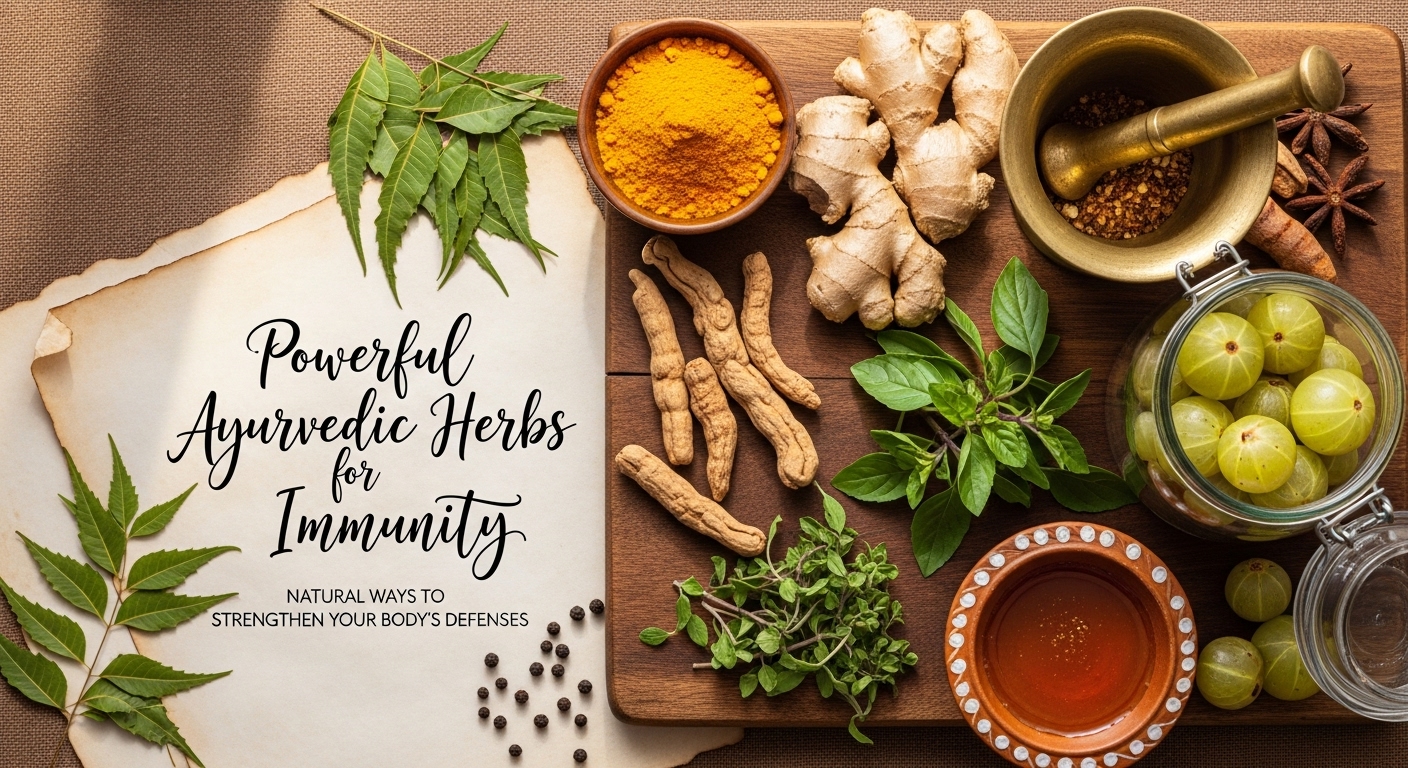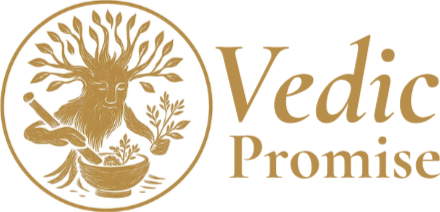
Powerful Ayurvedic Herbs for Immunity Natural Ways to Strengthen Your Body’s Defenses
Byashfaq1
- On
- InUncategorized
Introduction
In today’s world of environmental pollutants, stress, processed foods, and constant exposure to pathogens, maintaining a robust immune system has never been more crucial. While modern medicine offers various interventions, Ayurveda – the 5,000-year-old science of life – has long emphasized prevention over cure through natural immunity enhancement.
Ayurveda calls immunity “Vyadhikshamatva” – literally meaning “the power to resist disease.” This isn’t just about fighting off infections; it’s about building Ojas, the subtle essence of immunity that creates radiant health, vitality, and resilience at every level – physical, mental, and emotional.
The beauty of Ayurvedic herbs for immunity is that they work holistically. Rather than artificially stimulating the immune system (which can lead to autoimmune issues), these herbs modulate and balance immune function, strengthening defenses while maintaining harmony in the body.
In this comprehensive guide, we’ll explore 10 powerful Ayurvedic herbs that have been used for millennia to enhance immunity, backed by both traditional wisdom and modern scientific research. You’ll learn what makes each herb special, how to use them, and which one might be right for you.
1. Ashwagandha (Withania somnifera) – The Stress-Immunity Connection
Sanskrit Name: Ashwagandha (“Smell of a Horse” – gives strength of a horse)
Common Name: Indian Ginseng, Winter Cherry
Parts Used: Root primarily, sometimes leaves
Why It’s Powerful for Immunity
Ashwagandha is perhaps the most celebrated adaptogen in Ayurveda. While it’s famous for stress relief, its immune-enhancing properties are equally impressive. Here’s why:
Stress hormones like cortisol suppress immune function. Chronic stress is one of the biggest immunity killers. Ashwagandha helps normalize cortisol levels, thereby protecting immune function.
Key Immune Benefits
✓ Increases white blood cell count (lymphocytes and macrophages)
✓ Enhances antibody production
✓ Reduces inflammation (balances cytokines)
✓ Supports thymus gland (where T-cells mature)
✓ Improves sleep quality (when immunity regenerates)
✓ Reduces chronic stress (major immunity suppressor)
Scientific Evidence
Research published in the Journal of Ethnopharmacology found that Ashwagandha root extract significantly increased immune cell activity and improved overall immune response in participants over 8 weeks.
How to Use
Dosage: 300-500mg of standardized extract (5% withanolides) twice daily
Best Taken: With warm milk before bed (traditional method) or with meals
Duration: Minimum 6-8 weeks for best results; safe for long-term use
Best For: Those with chronic stress, poor sleep, or frequent infections
Pro Tip: Combine with black pepper for enhanced absorption.
2. Tulsi (Ocimum sanctum) – The “Queen of Herbs”
Sanskrit Name: Tulsi (literally “The Incomparable One”)
Common Names: Holy Basil, Sacred Basil
Parts Used: Leaves, seeds
Why It’s Powerful for Immunity
Tulsi is revered in Ayurveda as a “Rasayana” – a rejuvenative herb that promotes longevity and disease resistance. Every part of the Tulsi plant has medicinal properties.
Key Immune Benefits
✓ Natural antimicrobial (antibacterial, antiviral, antifungal)
✓ Protects against respiratory infections
✓ Rich in antioxidants (prevents cellular damage)
✓ Reduces fever naturally
✓ Supports lung health
✓ Adapts immune response to various stressors
Types of Tulsi
- Rama Tulsi (green leaves): Cooling, calming
- Krishna Tulsi (purple leaves): Warming, energizing
- Vana Tulsi (wild tulsi): Most potent medicinally
Scientific Evidence
Studies show that Tulsi’s essential oils (eugenol, camphene, cineole) have powerful antimicrobial properties. Research in Phytotherapy Research demonstrated that Tulsi enhanced immune memory and increased antibody titers.
How to Use
Dosage:
- Fresh leaves: 5-7 leaves daily (chew on empty stomach)
- Tulsi tea: 1-2 cups daily
- Extract/capsules: 300-600mg twice daily
Best Taken: Morning on empty stomach or as tea throughout the day
Duration: Daily use recommended, especially during cold/flu season
Best For: Respiratory health, daily immunity maintenance, stress
Traditional Practice: Many Indian households have a Tulsi plant and consume 2-3 fresh leaves daily for prevention.
3. Giloy (Tinospora cordifolia) – The Immunity Powerhouse
Sanskrit Name: Guduchi (literally “protects the body”)
Common Names: Giloy, Heart-leaved Moonseed, Amrit (Nectar of Life)
Parts Used: Stem, leaves
Why It’s Powerful for Immunity
Giloy is called “Amrita” (divine nectar) in Ayurveda because of its remarkable ability to enhance immunity and fight chronic fevers. It’s one of the most researched Ayurvedic herbs for immune modulation.
Key Immune Benefits
✓ Increases platelet count (important in dengue, viral fevers)
✓ Natural immunomodulator (strengthens immune response)
✓ Anti-pyretic (reduces fever)
✓ Detoxifies blood and liver
✓ Fights chronic infections
✓ Reduces auto-immune inflammation
Scientific Evidence
Research in International Immunopharmacology found that Giloy extract activated macrophages (immune cells that engulf pathogens) and increased production of cytokines needed for immune defense. It’s especially effective against recurrent fever and respiratory infections.
How to Use
Dosage:
- Fresh juice: 2-3 teaspoons with water on empty stomach
- Powder: 1/2 teaspoon twice daily with honey
- Capsules: 300-500mg twice daily
Best Taken: Morning on empty stomach for detoxification
Duration: 4-8 weeks during immunity-building phase; can use long-term
Best For: Chronic fever, recurrent infections, post-viral recovery
Ayurvedic Combination: Giloy + Tulsi + Black Pepper = Powerful immunity trio
4. Amla (Indian Gooseberry) – Vitamin C Powerhouse
Sanskrit Name: Amalaki (“The Sustainer” or “Fruit of Immortality”)
Common Name: Indian Gooseberry
Parts Used: Fruit
Why It’s Powerful for Immunity
Amla is one of the richest natural sources of Vitamin C on the planet – containing 20 times more Vitamin C than oranges. But unlike synthetic Vitamin C, Amla’s Vitamin C is heat-stable and bioavailable due to accompanying tannins.
Key Immune Benefits
✓ Extremely high Vitamin C (essential for immune cells)
✓ Powerful antioxidant (neutralizes free radicals)
✓ Anti-inflammatory
✓ Supports healthy aging (anti-aging properties)
✓ Enhances iron absorption (prevents anemia)
✓ Nourishes all seven tissues (Sapta Dhatus)
Scientific Evidence
Research shows that Amla enhances white blood cell function and increases production of protective antibodies. A study in European Journal of Clinical Nutrition found that Amla extract significantly improved immune markers in elderly participants.
How to Use
Dosage:
- Fresh fruit: 1-2 fruits daily (if available)
- Amla powder: 1 teaspoon with honey in the morning
- Amla juice: 20-30ml daily
- Capsules: 500-1000mg daily
Best Taken: Morning on empty stomach or with breakfast
Duration: Daily use recommended; especially valuable in winter
Best For: Daily immunity, skin health, anti-aging, vitamin C needs
Traditional Preparation: Amla is a key ingredient in Chyawanprash, the famous Ayurvedic immunity jam.
